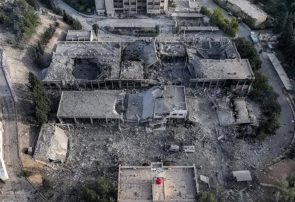TEHRAN (Iran News) With all eyes focusing on the tumultuous events shaping Syria following the fall of Bashar al-Assad’s government, the Israeli regime has seized the momentum to make territorial gains in Syria’s west while also destroying most Syrian military capabilities in an intensive bombing campaign.
Throughout the past week, Israeli forces struck nearly 500 targets across Syria, including in the capital Damascus, hitting ammunition depots, air defense installations and naval bases.
Israeli authorities justified the attacks on security grounds, saying they want to avoid weapons falling into the hands of “extremists”.
The Zionist regime has also pressed deeper into Syrian territory, occupying additional land along the already occupied Golan Heights.
The Israeli troops have moved into an officially designated demilitarized zone with Syria, which was part of a 1974 UN-brokered disengagement agreement. The UN has condemned the move saying it is a violation of the deal, Al Jazeera reported.
Israeli authorities say the move is temporary but have failed to provide any timetable for their withdrawal, raising concerns that the Zionist regime would seek to occupy or annex the area permanently.
The Golan Heights in Syria was occupied by Israel in the 1967 war and fully annexed in 1981 – a move not recognized by most of the international community.
In the meantime, Jordan is going to host a crisis summit on Syria over the weekend to be attended by top diplomats from Saudi Arabia, Iraq, Lebanon, Egypt, the UAE, Bahrain, Qatar, Turkey, the US, the European Union and the UN.
Carl Skau, deputy executive director of the UN World Food Program (WFP), has warned that Syria is facing the fallout from a 13-year civil war, a surge in arrivals from the Israel-Hezbollah war in neighboring Lebanon, and the unexpected removal of Bashar al-Assad.
While the situation in Syria’s largest city Aleppo is “quite calm and orderly”, Skau said, there’s still uncertainty in Damascus, where markets are disrupted, currency values have dropped, food prices are rising, and transport isn’t operational.
- source : tasnim






























